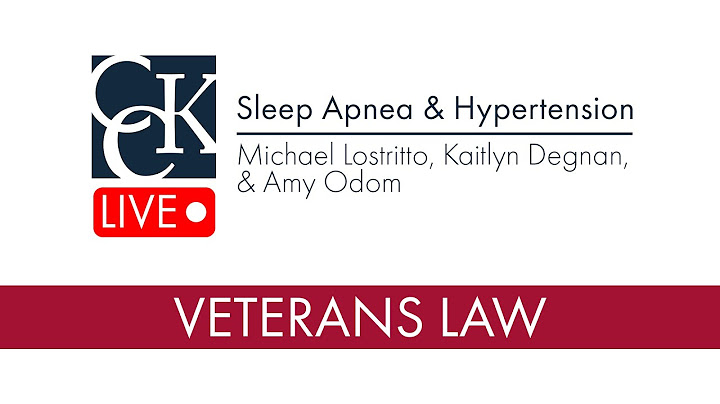Sleep apnea secondary to Veteran’s service-connected tinnitus Show
I opine that it is more likely than not that the veteran’s sleep apnea is caused by and/or aggravated by his service-connected tinnitus. Lai[i] et al reported in the study Higher prevalence and increased severity of sleep-disordered breathing in male patients with chronic tinnitus: Our experience with 173 cases: “Tinnitus and sleep are closely related. One of the most important aspects of tinnitus is its association with sleep disturbance. According to the literature, up to 71% of patients with tinnitus report sleep problems…” While sleep diseases (SDB) also include insomnia, a large percentage of tinnitus patients suffer from OSA. The Apnea Hypopnea Index (AHI) is the average number of combined apneas and hypopneas per hour. It is most often used to determine the severity of a person’s sleep apnea. Lai et al studied the incidence of sleep apnea as determined by the AHI score in 249 consecutive male patients with chronic tinnitus from August 2015 to August 2016. Of the 173 men enrolled, 16 (9.2%) were normal (AHI < 5), 43 (24.8%) had AHI between 5 and 15, 56 (32.3%) had moderate SDB with AHI between 15 and 30, and 58 (33.5%) had severe SDB (AHI > 30). The group had more overweight patients and less patients with normal BMI; however, the proportion of obese patients was comparable to that of the general population. Hence, BMI may not be considered a main reason for the increase in prevalence of SDB in this study. Lai concluded that SDB is much more common and severe in men with tinnitus. Lai noted that CPAP helps some tinnitus patients by providing better sleep quality and higher oxygenation during sleep. He concluded that tinnitus and SDB may be two sides of the same coin; tinnitus cause OSA and OSA aggravates tinnitus. That is, they are either co-morbidities or etiologically related. Eysel-Gosepath[ii] et al reported that approximately 60% of patients with tinnitus experience disturbances of the normal sleep pattern. Polysomnography was performed on 26 patients with tinnitus and sleep disturbances. In 17 of 26 patients polysomnography revealed a pathological sleep analysis: 10 patients were diagnosed with obstructive sleep apnea syndrome, 4 with insomnia and an increased index of arousals as well as a reduction of deep sleep and REM phases. Pathological movements of the legs were seen in 3 cases. In another study, Alster[iii] et al reported: “Sleep disturbance is a common and frequent complaint reported by tinnitus sufferers. Recent studies have shown that when insomnia and depression are associated with tinnitus there is decreased tolerance and increased discomfort with the tinnitus. The purpose of this study was to assess the reported prevalence and severity of sleep disturbance in chronic tinnitus patients. Patients (n = 80) were military personnel without major psychiatric disturbance and their tinnitus was associated with noise-induced permanent hearing loss (NIHL). Mini Sleep Questionnaire (MSQ) scores for sleep disturbance were found to be higher than those of normal controls in 77% of the patients. Self-rated depressive symptomatology was also highly correlated with sleep disturbance.” After reviewing all of the veteran’s medical and military records, and an interview with the veteran, it is my expert medical opinion that it is more likely than not (50% or more) that the veteran’s sleep apnea is caused by and/or aggravated by his service-connected conditions of PTSD, migraines and tinnitus. The medical literature supports such a nexus. While each of these conditions solely is sufficient to cause OSA, clearly a combination of these disabilities will cause OSA. The scientific observation that the derangement of REM sleep prominent in the patient with PTSD is the cause for sleep apnea is of particular importance in this case. [  Overview of TinnitusGenerally speaking, tinnitus refers to the perception of noise or ringing in the ears. Tinnitus affects approximately 15 to 20 percent of people in the United States, and a disproportionate number of veterans (see more below). Most often, tinnitus is a symptom of an underlying condition, such as hearing loss, ear injury, or a circulatory system disorder. Although it is very bothersome and can lead to significant impairment in everyday life, tinnitus is not typically life-threatening. The most common tinnitus symptoms may include phantom noises in the ears such as:
Such phantom noise may vary in pitch from a low to high and can occur in one or both ears. In some cases, the noise can be so loud that it interferes with individuals’ ability to concentrate or hear external sounds. Furthermore, tinnitus may be present at all times, or it may come and go. There are two main types of tinnitus, one of which is significantly more common than the other:
Causes of TinnitusThere are a number of health conditions that can cause or aggravate tinnitus, but an exact cause is not always established. However, in many people, tinnitus is caused by one of the following:
TreatmentTinnitus can often be improved with the appropriate treatment and intervention. For example, tinnitus may be treated with noise suppression, including:
Although medications cannot cure tinnitus, they may help reduce the severity of symptoms. Examples of common medications for tinnitus include the following:
Finally, there are several lifestyle adjustments and home remedies that may be helpful for individuals with tinnitus:
Veterans and TinnitusTinnitus is one of the most frequently claimed conditions for service connection. While on active duty, service members are consistently exposed to loud noises, including gunfire, machinery, armored vehicles, aircraft, and other combat-related noises. In addition, many veterans cope with TBIs stemming from traumatic injuries or exposure to improvised explosive devices (IEDs). As a result, tinnitus and hearing loss are common conditions from which veterans suffer. Symptoms of tinnitus can be more pronounced at night when one is lying down to sleep simply because it is quieter. For service members on active duty, however, quiet may not be something that is experienced very often. For this reason, a veteran may not even notice their tinnitus symptoms until long after they are discharged from service at which point they may decide to file a claim for VA disability benefits. VA Service Connection for TinnitusTo establish service connection for tinnitus on a direct basis, veterans must prove that there is a connection between their diagnosis and their time in service. Specifically, the following elements must be present: (1) a current diagnosis of tinnitus; (2) an in-service event, injury, or illness; and (3) a medical nexus linking the current diagnosis of tinnitus to the in-service event, injury, or illness. The following types of evidence are often used to develop and strengthen claims for tinnitus:
After service connection for tinnitus is established, VA will award a disability rating based on the severity of the condition. VA rates tinnitus under 38 CFR § 4.87, Schedule of Ratings – Ear, Diagnostic Code 6260. The condition of tinnitus almost always results in a 10 percent disability rating. Importantly, this singular 10 percent disability rating takes both ears into account. Does Tinnitus Cause Other Conditions?Tinnitus can cause significant impairments in a veteran’s everyday life and oftentimes results in a variety of other conditions as well. The most common secondary conditions to tinnitus explained below. Migraine Headache Conditions Secondary to TinnitusMigraine headaches are a type of headache characterized by intense pain that can be accompanied by nausea, vomiting, sensitivity to light and sounds, lightheadedness, and blurred vision. Migraines can be debilitating and can last anywhere from hours to days depending on the person. It is unclear what causes migraines, but triggers can include hormonal imbalance, alcohol, stress, and sensory stimulation (e.g., tinnitus). According to the American Migraine Foundation, there is a strong relationship between tinnitus and migraine headaches. Specifically, about 27 percent of individuals with tinnitus also suffer from migraines. Some individuals also report a worsening in tinnitus symptoms during migraine attacks. Recent studies suggest that tinnitus and migraines co-occur as a result of spontaneous abnormal neural activity; however, more research needs to be done in this area. Depression Secondary to TinnitusDepression is a serious mental health condition that affects the way a person thinks, feels, and acts. Symptoms of depression tend to vary amongst individuals; however, common symptoms include:
Current research also points to a significant relationship between tinnitus and depression. A 2015 study titled “The Correlation of the Tinnitus Handicap Inventory with Depression and Anxiety in Veterans with Tinnitus” looked at the percentage of veterans with tinnitus who also suffered from depression. The results revealed that 58.2 percent of the sample (i.e., 91 veterans with a diagnosis of tinnitus) had depression. Overall, tinnitus may cause complications with sleep thereby leading to stress, fatigue, and ultimately, depression. Anxiety Secondary to TinnitusAnxiety is defined as intense, excessive, and persistent worry and fear about everyday situations. It is estimated that one-third of adults in the United States suffer from anxiety disorders. The most common symptoms of anxiety disorders include the following:
The study referenced above also found that 79.1 percent of the sample also suffered from anxiety. Importantly, 58.2 percent of the sample suffered from both anxiety and depression. Somatic Symptom Disorder Secondary to TinnitusSomatic symptom disorder is characterized by an extreme focus on physical symptoms, such as pain or fatigue, that causes major emotional distress and problems with social and occupational functioning. Oftentimes, individuals with somatic symptom disorder have another diagnosed medical condition that is associated with these symptoms. However, the individual’s reaction to the actual medical condition is excessive or disproportionate to the actual problem. Veterans may become overly focused on their tinnitus symptoms and begin to worry about them excessively. Sleep Apnea Secondary to TinnitusSleep apnea is a potentially serious sleep disorder in which a person’s breathing is repeatedly interrupted during the course of the night. There are three main types of sleep apnea, including the following: (1) obstructive sleep apnea; (2) central sleep apnea; and (3) complex (mixed) sleep apnea syndrome. Generally speaking, the most common symptoms include: loud snoring, gasping for air during sleep, awakening with a dry mouth, morning headache, insomnia, hypersomnolence (i.e., excessive daytime sleepiness), and difficulty concentrating. One previous study assessed the reported prevalence and severity of sleep disturbance in chronic tinnitus patients. Of these patients, 80 were military personnel with a diagnosis of tinnitus associated with noise-induced permanent hearing loss. Mini Sleep Questionnaire (MSQ) scores for sleep disturbance were found to be higher than those of normal controls in 77 percent of the patients. The highest MSQ scores in tinnitus patients were for delayed sleep, morning awakenings, mid-sleep awakenings, morning fatigue, and chronic fatigue. Secondary Service Connection for Secondary Conditions to TinnitusA secondary service-connected condition is one that resulted from a separate condition that is already service-connected. For example, if a veteran is service-connected for tinnitus and later develops one of the above-mentioned conditions as a result, they may be eligible for secondary service connection. Filing a claim for conditions secondary to tinnitus involves the same process as filing any claim for service connection. Specifically, veterans will fill out and submit VA Form 21-526 – an original claim for service connection. Veterans may do so online using the eBenefits portal, in person at their local Regional Office, or with help from a veterans’ advocate. Importantly, there is certain evidence that veterans should include with their claims for secondary service connection. Specifically, veterans will need to demonstrate two things to VA to be granted service connection for secondary conditions to tinnitus: (1) a diagnosis for their secondary condition; and (2) medical evidence showing the link between their service-connected tinnitus and the secondary condition. Does the VA recognize sleep apnea secondary to tinnitus?For example, sleep apnea can be rated as a secondary condition to a Veteran's tinnitus. A condition being rated as secondary rather than primary can affect its disability rating — which also affects the benefits a Veteran may expect.
What can be secondary to tinnitus from the VA?Tinnitus is one of the most commonly claims conditions by veterans, and it can lead those affected to develop secondary conditions such as sleep disorders, anxiety, and migraines.
What is sleep apnea secondary to VA?A veteran can also establish service connection for sleep apnea on a secondary basis. This means that a veteran has an already service-connected disability that caused the veteran to have sleep apnea. In this case, there must be a medical nexus to link the sleep apnea to their already service-connected disability.
Can sleep apnea be related to hearing loss?The study authors found that sleep apnea was associated with a 31 percent increase in high frequency hearing impairment and a 90 percent increase in low frequency hearing impairment. Sleep apnea was also linked to a 38 percent increase in both high and low frequency hearing loss.
|

Related Posts
Advertising
LATEST NEWS
Advertising
Populer
Advertising
About

Copyright © 2024 moicapnhap Inc.


















